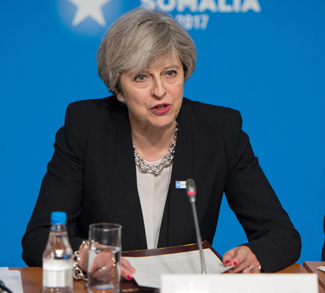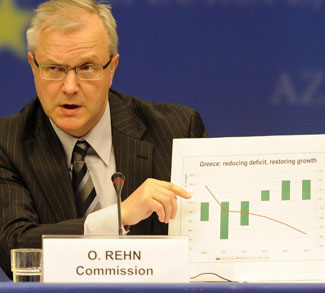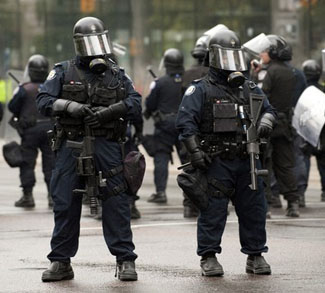FORECAST
Although the dust hasn’t even settled from last month’s Euro financial crisis in the PIGS countries, another sovereign wealth shock may be just around the corner.
It should be stated from the outright that the British economy is more fundamentally sound than that of Greece. However, there are several weaknesses that ‘bond vigilantes’ may come to target in the near future.
One of these weaknesses stems from the fact that the United Kingdom, like Greece, is sinking into high levels of public debt. This year, the UK’s federal budget deficit weighed in at 12.8 percent of its GDP; a figure that is higher than Greece’s. In 2008-9, the UK’s gross public debt reached 55 percent of its GDP. While this figure is well under Greece’s debt level of 113 percent of GDP, high levels of deficit spending are expected to drive Britain’s gross debt level to 82 percent of GDP by next year alone.
Soft economic fundamentals will eventually have the effect of frustrating efforts to find foreign buyers for government bonds, and the British population is not in any position to pick up the slack. By the end of 2008, the average debt-to-income ratio for British households was 181.4 percent according to the Organization for Economic Cooperation and Development. This figure makes the average American household- whose ratio stands at 131.6 percent- look miserly.
While these numbers can inspire pessimism, the British economy benefits from a few advantages vis-à-vis Greece. Britain still controls its own monetary policy, affording the government more flexibility in dealing with the crisis. Also, unlike Greece, most of Britain’s outstanding debt doesn’t come due for many years to come, allowing the government more time to reign in public spending and restore investor confidence.
However, if there is a lesson to be learned from the Greece crisis, it is that a prevailing mood, and not economic fundamentals, can fast turn into a self-fulfilling economic prophecy. Last month, a sudden loss in confidence in Greek bonds proved infectious, and it almost served to create the default that investors feared in the first place.
The UK’s upcoming general election could conceivably trigger a similar investor panic. The Labour Party has recently been chipping away at the Conservative’s once-dominant lead, and they are now only five percent off the pace. If the election results in a hung parliament-where no party earns a clear majority- then market players will come to assume that difficult political decisions on the deficit and public spending will not be forthcoming. International credit agencies have already warned that the United Kingdom could lose its triple-A rating if the winner of the election does not implement sweeping spending cuts.
A hung parliament could trigger a similar crisis to that which recently transpired in Greece, and the British government would suddenly find itself hard-pressed to raise enough money to meet its obligations.
Unlike Greece, the British government has the option to print money to pay its bills; a course of action that raises fears of sudden inflationary spikes. The Bank of England has already pumped $325 billion USD into the British economy under its policy of ‘quantitative easing’, and expert opinion is mixed over whether that in itself will lead to inflation down the line.
Britain is facing down economic crisis over the next few years. Massive bailout spending has, depending on who you ask, saved Britain and the world from economic calamity but it has not produced a substantial economic recovery. Now, markets are applying pressure on governments running high deficits, and the resultant ‘austerity’ plans will likely plunge national economies back into recession.
A country like Britain, with a high deficit and spiking public debt, makes for a good target for bond vigilantes. It won’t be their last.
SUMMARY OF EVENTS: March 1st – March 8th, 2010
NORTH AMERICA
United States
A US Congressional committee is debating a resolution to label as genocide the killing of Armenians by Turkish forces during World War I.
US President Barack Obama is planning “dramatic reductions” in the country’s nuclear arsenal, a senior US administration official has said.
Canada
Canada’s Prime Minister Stephen Harper announced a five-year spending plan with cuts to defense, international aid and government operations in a bid to be the first Group of Seven country to erase its deficit after the global financial crisis.
LATIN AMERICA
Chile
One man was reported shot and killed, and about 160 people were arrested as police tried to control post-earthquake looting in parts of Chile.
WESTERN EUROPE
United Kingdom
Defense spending on protecting the Falkland Islands has plunged by 50% cent in just six years, it was claimed by a report in London’s Daily Mail.
A former member of Bosnia’s wartime presidency has been held at Heathrow Airport over alleged war crimes.
Greece
The Greek government has approved a new package of tax increases and spending cuts to save 4.8bn euros ($6.5bn; £4.4bn) and ease its budget crisis.
Greece will need to take further action in 2011 and 2012 to repair its public finances, EU Economic and Monetary Affairs Commissioner Olli Rehn said in an interview on Thursday.
MIDDLE EAST
Iraq
Iraq’s second parliamentary election since the 2003 invasion has been hit by multiple attacks, with at least 35 people being killed.
At least 14 people have been killed in Baghdad on the first day of voting in Iraq’s parliamentary elections.
At least 29 people have been killed and 42 more wounded in three powerful co-ordinated suicide attacks in the central Iraqi city of Baquba.
Iran
The authorities in Iran have closed down the country’s biggest-circulation reformist newspaper, Etemaad, accusing it of breaching media laws.
China says diplomacy should be given further time in the dispute over Iran’s nuclear program, as US officials press for new UN sanctions on Tehran.
Two Iranians and five Italians have been arrested by Italian police on suspicion of trafficking arms to Iran, anti-terror police say.
SOUTH ASIA
Pakistan
A US-born spokesman for al-Qaeda has been arrested in Karachi, Pakistani security officials have said.
Afghanistan
A roadside bomb has killed 11 civilians in southern Afghanistan’s Helmand province, officials say.
India
India plans to allocate 1.47 trillion rupees ($31.71 billion) to defense spending for the next fiscal year, Finance Minister Pranab Mukherjee said Friday while presenting the annual budget in Parliament.
EAST ASIA
China
Chinese Foreign Minister Yang Jiechi said Sunday that enhanced cooperation among Brazil, Russia, India and China, or the BRIC countries, is beneficial to the world.
China has said its defense spending will increase by 7.5% in 2010, ending a long run of double-digit growth.
A Chinese police chief has been ordered to resign and a deputy chief has been fired amid allegations that a man died in custody after being tortured.
AFRICA
Nigeria
Scores of people have been reported killed in suspected religious clashes near the central Nigerian city of Jos.
Sudan
The United States has expressed concern over reports that the Sudanese army launched offensives against rebels in Darfur after signing a peace deal with the main rebel group there last week.
Somalia
At least 10 civilians and four militants were killed Tuesday in a gunfight between government forces and Islamists insurgents in Somalia, witnesses report.
Last year Somalia’s Radio Warsan was a pro-government station that vilified al-Qaida-linked insurgents. Today it is in the hands of the rebels as they battle the U.N.-backed government on the ground with guns and on the nation’s airwaves with pro-jihad messages.
The British government said Monday it is banning Somali terrorist organization al-Shabab, an al-Qaida-linked Islamist group fighting the anarchic country’s transitional government.




